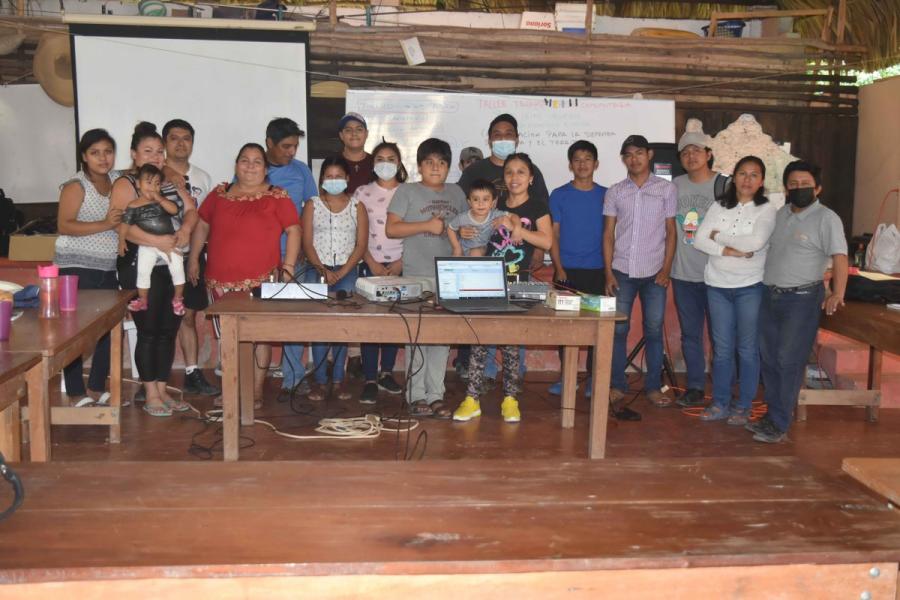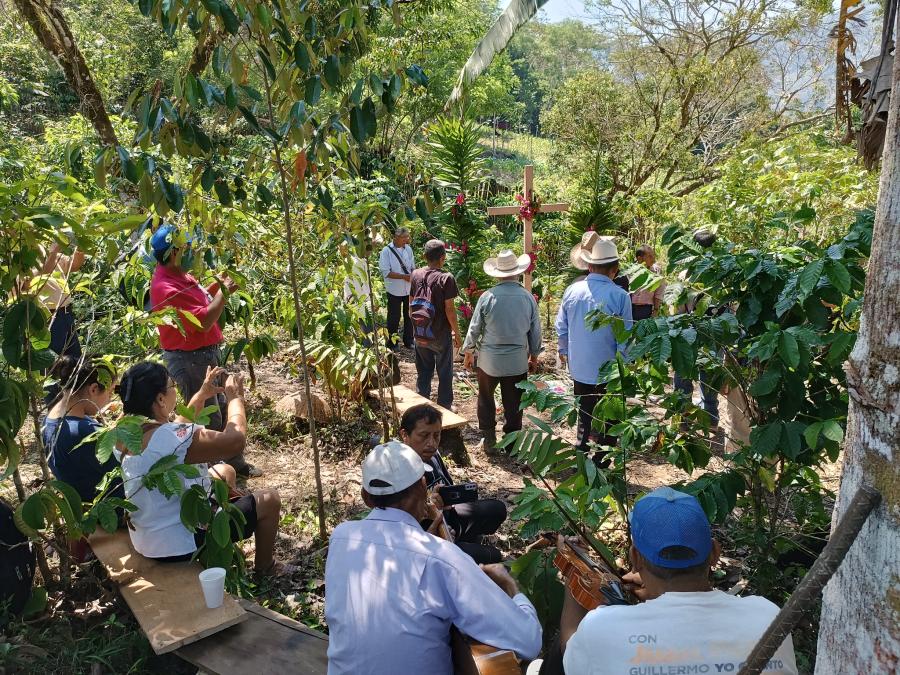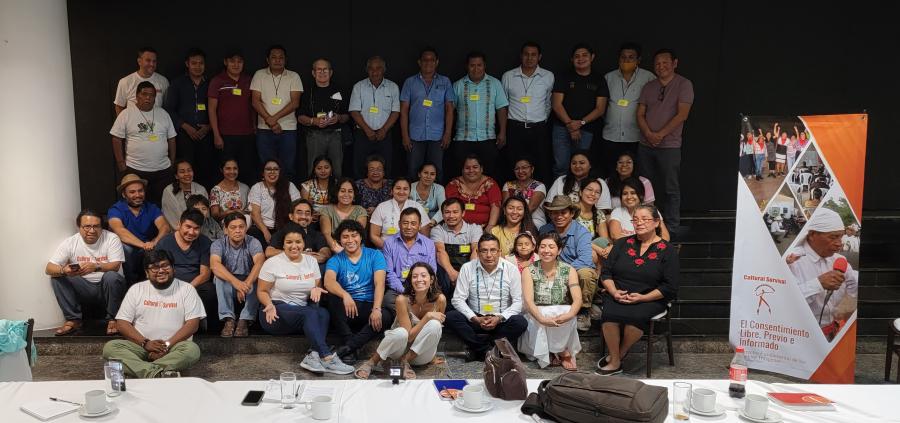By Las Abejas Acteal
"We want a form of communication that allows us to build a real policy, with the participation of the people. We want to offer information so that our people know the problems they have, understand where they come from, and have the tools to actively participate in their resolution. " - Las Abejas Communications
At the core of the campesina and Indigenous struggles in Mexico is the defense of our land and natural resources. We fight against dispossession, racism, discrimination, injustice, and impunity for crimes and violations against us. A vital participant in this activism is Las Abejas de Acteal, a civil organization composed of about 1,000 people in 26 communities in the municipalities of Chenalhó, Pantelhó, and Simojovel in the region of Los Altos de Chiapas. It was established in 1992 after the Zapatista uprising in the Cathedral of San Cristóbal de Las Casas and in San Andrés Larráinzar, and is an important part of the Indigenous movement defending land and territory in the state of Chiapas. The organization played a significant role in the Dialogues for Peace.
On December 22, 1997 in La Casa de la Memoria y la Esperanza (House of Memory and Hope) in Acteal, municipality of Chenalhó, 45 Indigenous townspeople who were members of Las Abejas were massacred while attending a Catholic prayer meeting. The massacre is commemorated on the 22nd of every month; in this way, the political identity of Las Abejas has a religious dimension embodied in the experience of the believing people through public prayer, fasting, and pilgrimages as a non-violent means to seek social change. Las Abejas is not affiliated with any political party and its members do not receive government support. “We cannot walk with two bosses or two leaders. We want to walk with only one leader [the word of God],” explains a member of Las Abejas.
The organization’s struggle for autonomy is reflected in the areas of its work, which include communication, healthcare, and economic projects such as the organization's savings bank and the women's embroiderers' cooperative. The Communications Area was created in 2000 with the objective of keeping our communities informed and making our reality known, promoting culture, and strengthening activism for peace, justice, and autonomy as Native Peoples of Mexico. “Communication should be in some way an instrument or tool to inform people about the wisdom, the problems, and the struggle of Las Abejas. Let communication be like the hoe, the machete, the stick to sow the corn and beans. When we have food, the heart of a family is happy. Let communication serve for popular education," says José Alfredo, a member of the Communications Area of Las Abejas.
The task of this area is developed around internal or community communication and through the organization's external or social communication. The Communication Area of Las Abejas de Acteal is in charge of disseminating public activities of the organization, for example: in the monthly commemorations of the Acteal Massacre, a statement is issued as the official word of Las Abejas regarding the situation of human rights. of the original peoples, the dispossession of lands and territories by the rich and powerful of the capitalist system in complicity with the government in power. This written word is complemented with photos and later made public through the blog and social networks (Facebook, Twitter, and Instagram) of said organization. In addition, live broadcasts are made on Facebook and we hold press conferences on the cases of the Acteal Massacre and the murder of our colleague Simón Pedro, who was murdered on July 5, 2021.
Within the Communications Area, the radio project Almantal Yu'un lekilal (Messengers of Peace) was born, a community radio station that is fundamental for the construction of our autonomy and the quest for justice with peace and dignity for the Acteal Massacre. “We think that radio is one of the most effective means to explain in our Tsotsil culture...we are not accustomed to reading and writing, since all the knowledge and wisdom of our ancestors have been inherited and safeguarded through orality. In this current social, political, economic, and cultural situation in our country, we have to be well informed in order to know what steps and words we have to take in this regard," says Eduardo Gutiérrez, member of the Communications Area of Las Abejas.
At Radio Almantal Yu'un lekilal, we work with men and women who belong to Las Abejas, and a priority of our work is to take care of the information we transmit through the radio. It is important for us to transmit our news and analysis programs, health issues, education, human rights, women's rights, and defense of land, territory, and natural resources in the Tsotsil and Tseltal languages. The coordinators and representatives of Las Abejas participate in our programs, and we actively encourage the participation of women.
The support that strengthens our work, such as that provided by Cultural Survival from March 2021–May 2022, is vital. As Guadalupe Vázquez, coordinator of the project “Strengthening of the radio station Almantal Yu'un Lekilal/Messengers of Peace,” says, “Cultural Survival's support has been very important for the Communications Area of Las Abejas because more members have joined. There are many young people who want to join but have no money, and with this type of project they help us with transportation, to have something to eat, and to buy equipment.
In radio, academic knowledge is not important. What counts in community-based communication is the experience and the conviction of the communicator. Through their work, they must believe that they are making a contribution to change the world and to contribute to peace and justice, eradicating the competitive mindset of consumerism and individualism. This work should not be done for financial gain, so that when there are no financial resources, the communicator won’t become discouraged and abandon their position.
We believe that in communication, no one is more or less than; we should all be of equal value and work together. Age does not matter, nor the level of experience. At work it is about sharing and exchanging. The goal is for us all to be committed communicators, and that with our work we make a contribution, no matter how small, to popular education and respect for the thoughts and actions of women and the needs of the children so that they can be true builders of peace and justice. Those who are trained now must forge the path so that those who come later can have their own proposal in the making of a video or a radio program. If a communicator leaves, let another continue the work. The important thing is that the seed of communication becomes a big tree that produces fruits and seeds so that the tree of communication is always young, healthy, and strong.
Increasingly, Indigenous Peoples’ human rights and right to life are being violated, while the destruction of our Mother Earth is a constant threat. At radio Almantal Yu'un Lekilal, we want to continue working in the long term. We know that the journey will not be easy. However, the project promoted by Cultural Survival has given us hope to continue and grow our Communications Area and to grow the radio project. Cultural Survival’s contribution has been of great help and encouragement to enlist new members for this work. We thank you from the bottom of our hearts for your support in carrying out these workshops.
In 2021, las Abejas Acteal received a grant from Cultural Survival's Indigenous Community Media Fund. The Indigenous Community Media Fund provides opportunities for international Indigenous radio stations to strengthen their infrastructure and broadcast systems and creates training opportunities for journalism, broadcasting, audio editing, technical skills, and more for radio journalists from Indigenous communities around the world. In 2021, the Indigenous Community Media Fund supported 57 media projects in 23 countries, totaling $340,500.



